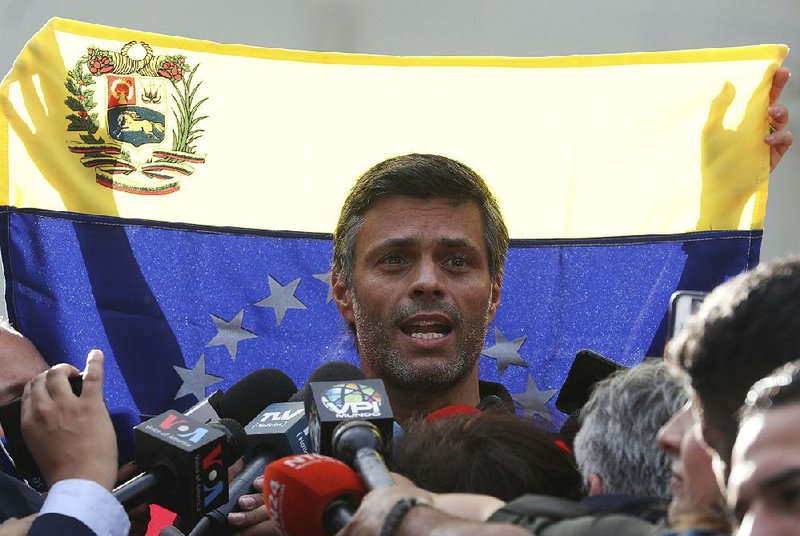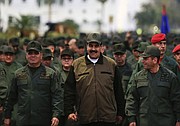CARACAS, Venezuela -- Venezuela's opposition sought to maintain pressure Thursday on President Nicolas Maduro through further protests as the socialist leader convened a weekend of dialogue to critique his mandate and fine-tune "the revolution."
After a failed attempt to stage a peaceful military revolt Tuesday and overthrow Maduro, the opposition was facing limited options. Venezuela's pro-Maduro Supreme Court increased the pressure on the opposition Thursday by issuing an arrest warrant for key leader Leopoldo Lopez, Guaido's political mentor.
Lopez escaped house arrest early Tuesday and appeared with Guaido and a small band of soldiers that morning as Guaido called on the military to rise up against Maduro.
Notably, no warrant was issued for Guaido -- whose arrest has been viewed as red line by his backers in President Donald Trump's administration.
"Leopoldo Lopez violated house arrest, and he also violated the measure regarding political pronouncements through conventional and nonconventional media," the Supreme Court said in a statement.
Lopez sought refuge this week at the Spanish Embassy in Caracas. Venezuelan soldiers reportedly were seen outside the embassy Thursday.
Guaido on Wednesday called on Venezuelans to stage daily protests until Maduro leaves. The campaign, opposition officials said, included an appeal to public servants to show civil disobedience by wearing blue armbands to work.
After two days of violent protests that left four people dead and dozens wounded, the opposition was banking on a resilient populace to continue the effort -- though it remained unclear how Venezuelans would respond. Guaido insisted late Wednesday that political change remains within Venezuela's grasp.
His call for continued protests, however, lacked specific details -- and the capital on Thursday appeared to return to normal. At one small protest at Central University of Venezuela, angry students asked why more people weren't in the streets.
"Enough with this indifference," said Valenrina Gonzalez, a 21-year-old dentistry major. "We need people to turn out every day, every day until we achieve change."
"As long as we are mobilized and united, we are very close to achieving our freedom," Guaido said on the Fox Business Network. "Can't tell you a specific date or time. Working on transition. Democracy has always taken time."
Early Thursday, Maduro appeared at a military base in western Caracas alongside Vladimir Padrino Lopez, a member of the president's inner circle who the Trump administration has said was negotiating his ouster.
"The empire is investing in dividing us and say there's a civil war in Venezuela," Maduro said, referring to the United States. "They say they have to intervene, to weaken our homeland. No matter the circumstance we have to be united, and that's what loyalty is. It has to be a collective strength."
The Trump administration has said that Maduro was prepared Tuesday to abandon office and flee to Havana, before being stopped by the Russians -- a claim that Maduro strongly denied.
In a phone call with Secretary of State Mike Pompeo, Russian Foreign Minister Sergei Lavrov complained that the United States was clearly supporting opposition attempts to overthrow the government.
"The Russian side stressed that Washington's interference in the internal affairs of a sovereign state, and its threat against its leadership, was a gross violation of international law," he said. Continuing to do so would entail "serious consequences," he added.
Washington also has said that senior officials in Maduro's administration have been negotiating his departure. On Tuesday, Maduro replaced his intelligence chief, Maj. Gen. Manuel Ricardo Cristopher Figuera, after he appeared to defect to the opposition.
While vowing to remain in power, Maduro late Wednesday issued a call for dialogue. Although he has repeatedly called for dialogue and admitted errors in the past, he has rarely engaged those who call his rule illegal after discredited elections last year. Nor has he enacted meaningful reform.
Nevertheless, Maduro decreed two days of open critique on Saturday and Sunday -- sessions likely to be held within very strict parameters of debate.
He called for "action and proposals from all the people, so they tell Nicolas Maduro what we have to do to create a plan to change the revolution, to rectify mistakes in the middle of the battle."
Guaido, the head of Venezuela's opposition-controlled National Assembly, declared himself president in January. He calls Maduro a "usurper."
Information for this article was contributed by Michael Brice-Saddler and Amie Ferris-Rotman of The Washington Post.
A Section on 05/03/2019

